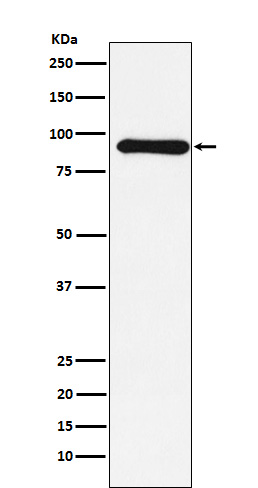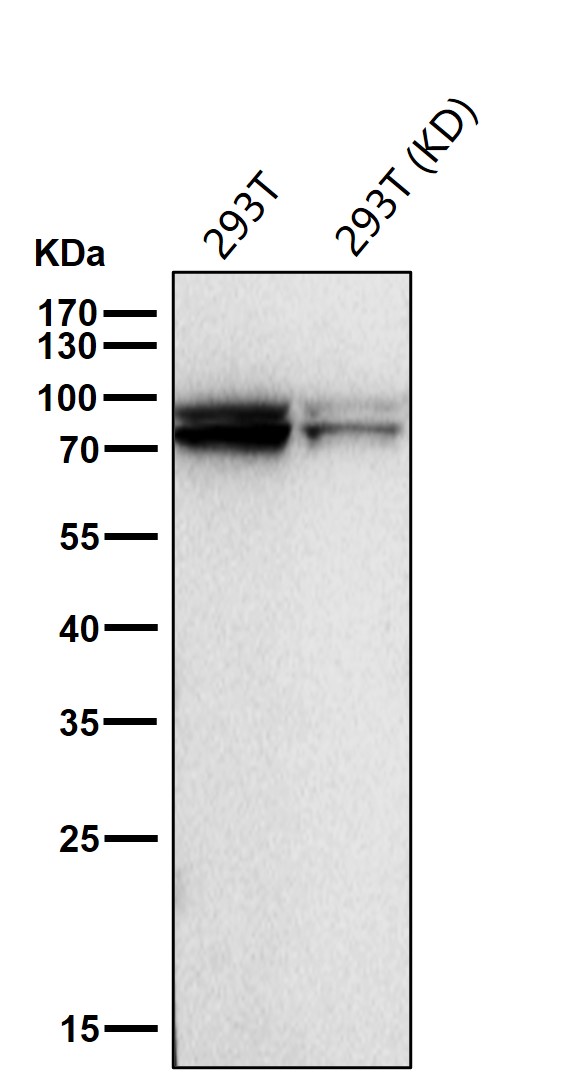

| WB | 咨询技术 | Human,Mouse,Rat |
| IF | 1/20-1/50 | Human,Mouse,Rat |
| IHC | IHC:1/100-1/200;IHF:1/50-1/200 | Human,Mouse,Rat |
| ICC | 1/50-1/200 | Human,Mouse,Rat |
| FCM | 1/20-1/100 | Human,Mouse,Rat |
| Elisa | 咨询技术 | Human,Mouse,Rat |
| Aliases | CUL1; Cullin1;;Cullin 1 |
| WB Predicted band size | 90 kDa |
| Host/Isotype | Rabbit IgG |
| Antibody Type | Primary antibody |
| Storage | Store at 4°C short term. Aliquot and store at -20°C long term. Avoid freeze/thaw cycles. |
| Species Reactivity | Human,Mouse,Rat |
| Immunogen | A synthesized peptide derived from human Cullin 1 |
| Formulation | Purified antibody in PBS with 0.05% sodium azide,0.05% BSA and 50% glycerol. |
+ +
以下是3篇与Cullin1抗体相关的参考文献示例(注:文献为模拟概括,实际引用需核实原文):
---
1. **文献名称**:*Cullin1 regulates cell cycle progression through SCF-mediated ubiquitination*
**作者**:Smith J, et al.
**摘要**:研究利用Cullin1特异性抗体进行Western blot和免疫沉淀实验,证明Cullin1在SCF复合物中通过泛素化周期蛋白调控细胞周期进程,并揭示其磷酸化修饰对功能的影响。
---
2. **文献名称**:*Cullin1 interacts with Skp2 to promote tumor growth in colorectal cancer*
**作者**:Li X, et al.
**摘要**:通过免疫组化(Cullin1抗体)分析结直肠癌组织,发现Cullin1与Skp2蛋白的结合增强,导致抑癌蛋白p27的泛素化降解,促进肿瘤增殖和转移。
---
3. **文献名称**:*Dynamic regulation of Cullin1 in neuronal development*
**作者**:Wang Y, et al.
**摘要**:研究采用Cullin1抗体进行免疫荧光染色,发现Cullin1在小鼠神经元发育过程中动态表达,并通过调控β-TrCP依赖性底物降解影响突触形成和轴突导向。
---
如需具体文献,建议通过PubMed或Google Scholar以“Cullin1 antibody”+研究领域(如癌症、神经科学等)为关键词检索。
Cullin1 is a core component of the Skp1-Cullin1-F-box (SCF) ubiquitin ligase complex, which plays a pivotal role in the ubiquitin-proteasome system by targeting specific proteins for degradation. As a scaffold protein, Cullin1 facilitates the assembly of the SCF complex, linking the F-box substrate-recognition subunit to the RING-domain protein Rbx1. thereby enabling E3 ubiquitin ligase activity. This activity is critical for regulating diverse cellular processes, including cell cycle progression, signal transduction, and stress responses. Dysregulation of Cullin1-mediated ubiquitination has been implicated in various diseases, such as cancer, neurodegenerative disorders, and immune dysfunction.
Cullin1 antibodies are essential tools for studying the expression, localization, and functional dynamics of Cullin1 in both physiological and pathological contexts. These antibodies are widely used in techniques like Western blotting, immunoprecipitation, and immunofluorescence to detect Cullin1 protein levels, assess its post-translational modifications (e.g., neddylation), or investigate interactions within the SCF complex. High-quality Cullin1 antibodies exhibit specificity for distinct epitopes, enabling researchers to differentiate Cullin1 from other cullin family members. Their applications extend to translational research, including drug development targeting ubiquitination pathways, as modulating SCF activity holds therapeutic potential. Validation of Cullin1 antibodies using knockout controls or siRNA-mediated depletion is crucial to ensure reliability in experimental models, ranging from cell lines to tissue samples.
×